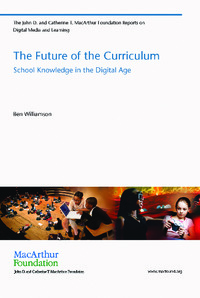The Future of the CurriculumSchool Knowledge in the Digital Age
|

|
 Diese Seite wurde seit 2 Jahren inhaltlich nicht mehr aktualisiert.
Unter Umständen ist sie nicht mehr aktuell.
Diese Seite wurde seit 2 Jahren inhaltlich nicht mehr aktualisiert.
Unter Umständen ist sie nicht mehr aktuell.
 Zusammenfassungen
Zusammenfassungen
 Although ideas about digital media and learning have become an important area for educational research, little attention has been given to the practical and conceptual implications for the school curriculum. In this book, Ben Williamson examines a series of contemporary curriculum innovations in the United States, Great Britain, and Australia that reflect the social and technological changes of the digital age. Arguing that the curriculum is always both forward- and rearward-looking, Williamson considers how each of these innovations represents a certain way of understanding the past while also promoting a particular vision of the future.
Although ideas about digital media and learning have become an important area for educational research, little attention has been given to the practical and conceptual implications for the school curriculum. In this book, Ben Williamson examines a series of contemporary curriculum innovations in the United States, Great Britain, and Australia that reflect the social and technological changes of the digital age. Arguing that the curriculum is always both forward- and rearward-looking, Williamson considers how each of these innovations represents a certain way of understanding the past while also promoting a particular vision of the future.
The curriculum initiatives are all examples of what Williamson calls "centrifugal schooling," expressing a vision of education and learning that is decentered, distributed, and dispersed, emphasizing networks and connections. In centrifugal schooling, a curriculum is actively assembled and improvised from a heterogeneous mix of people, groups, coalitions, and institutional structures. Participants in curriculum design and planning include local governments, corporations, foundations, charities, and nongovernmental organizations.
Among the curriculum innovations Williamson examines are High Tech High, a charter school network in San Diego that integrates technical and academic education; Opening Minds, a "competence-based" curriculum used in 200 British secondary schools; and Quest to Learn, a "school for digital kids" in New York City (with a sister school in Chicago). He also describes two major partnerships: the Partnership for 21st Century Skills, which advocates for "21st century readiness" for American students; and the Whole Education Alliance in Britain, a network of "third sector" educational organizations.
 Dieses Buch erwähnt ...
Dieses Buch erwähnt ...
 Personen KB IB clear | David Buckingham , Manuel Castells , Cathy N. Davidson , J. P. Gee , David Theo Goldberg , Henry Jenkins , Jaron Lanier , Zizi Papacharissi , Neil Selwyn , Juha Suoranta , Sherry Turkle , Tere Vadén | |||||||||||||||||||||||||||||||||||||||||||||||||||||||||||||||||||||||||||||||||||||||||||||||||||
 Begriffe KB IB clear | Bildungeducation (Bildung)
, Curriculum / Lehrplancurriculum
,  Digitalisierung
, Digitalisierung
,  Innovation Innovation innovation
, innovation
,  Lernen Lernen learning
, learning
,  Schule Schule school
, school
,  Zukunft Zukunft future future
| |||||||||||||||||||||||||||||||||||||||||||||||||||||||||||||||||||||||||||||||||||||||||||||||||||
 Bücher |
|
 Dieses Buch erwähnt vermutlich nicht ...
Dieses Buch erwähnt vermutlich nicht ... 
 Nicht erwähnte Begriffe | Gesellschaft, Kinder, LehrerIn, Lehrplan 21, Schweiz, Unterricht |
 Tagcloud
Tagcloud
 Zitationsgraph
Zitationsgraph
 Zitationsgraph (Beta-Test mit vis.js)
Zitationsgraph (Beta-Test mit vis.js)
 Zeitleiste
Zeitleiste
 2 Erwähnungen
2 Erwähnungen 
- Digital Sociology (Deborah Lupton) (2015)

- Second Handbook of Information Technology in Primary and Secondary Education (Joke Voogt, Gerald Knezek, Rhonda Christensen, Kwok-Wing Lai) (2018)


 Volltext dieses Dokuments
Volltext dieses Dokuments
 Bibliographisches
Bibliographisches 
 Beat und dieses Buch
Beat und dieses Buch
Beat hat dieses Buch während seiner Zeit am Institut für Medien und Schule (IMS) ins Biblionetz aufgenommen. Beat besitzt kein physisches, aber ein digitales Exemplar. (das er aber aus Urheberrechtsgründen nicht einfach weitergeben darf). Es gibt bisher nur wenige Objekte im Biblionetz, die dieses Werk zitieren.



















 , 2880 kByte)
, 2880 kByte) 



 Biblionetz-History
Biblionetz-History